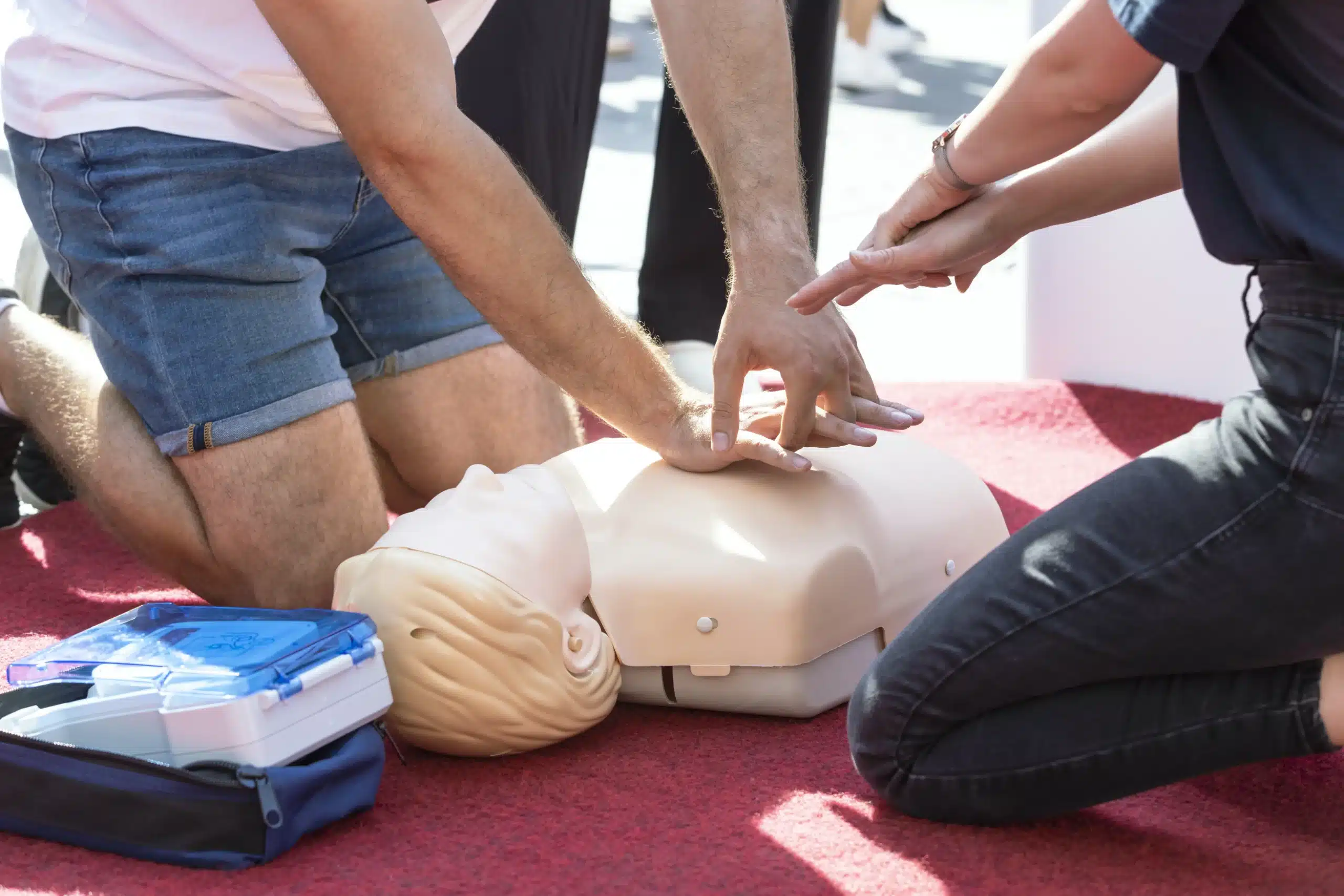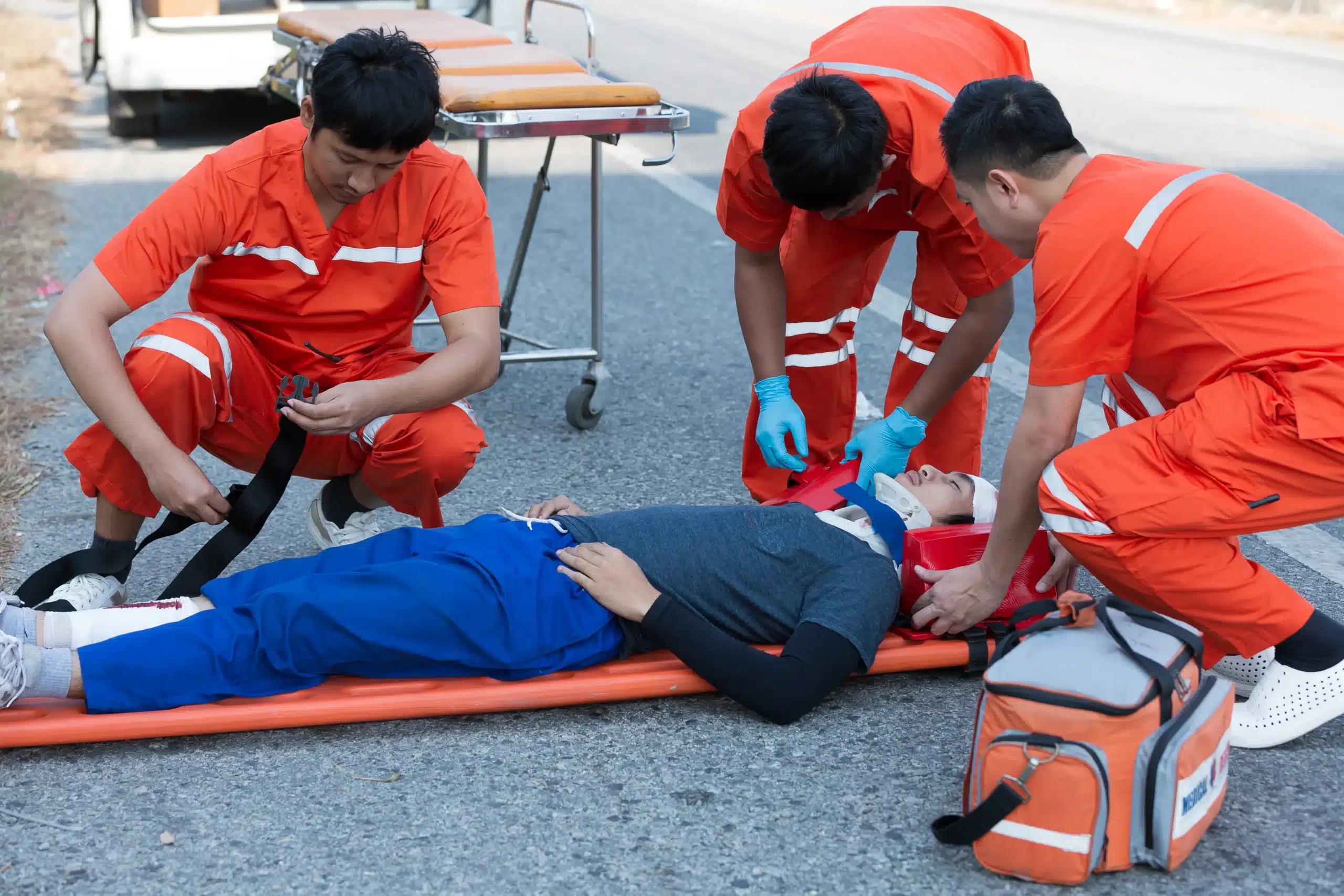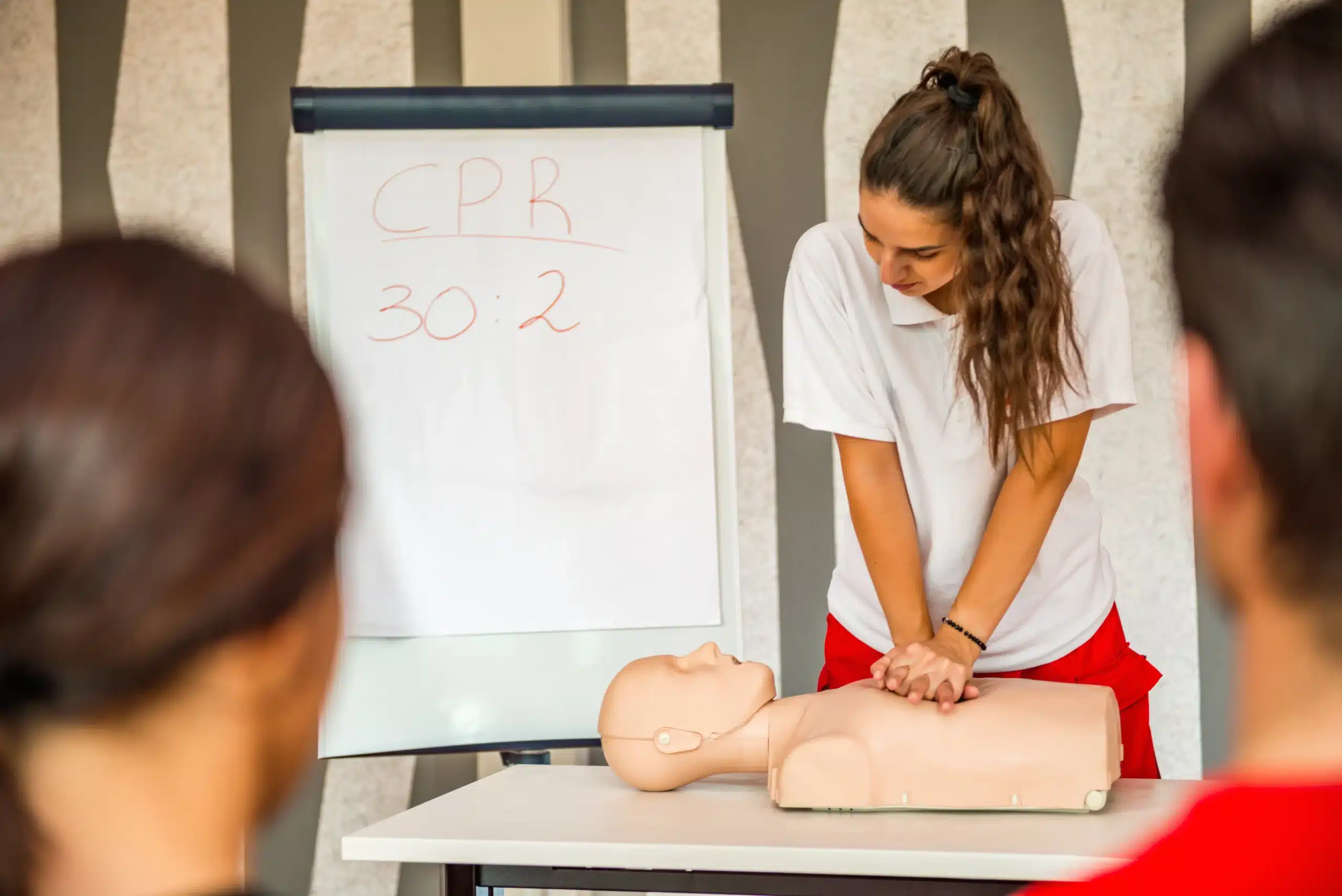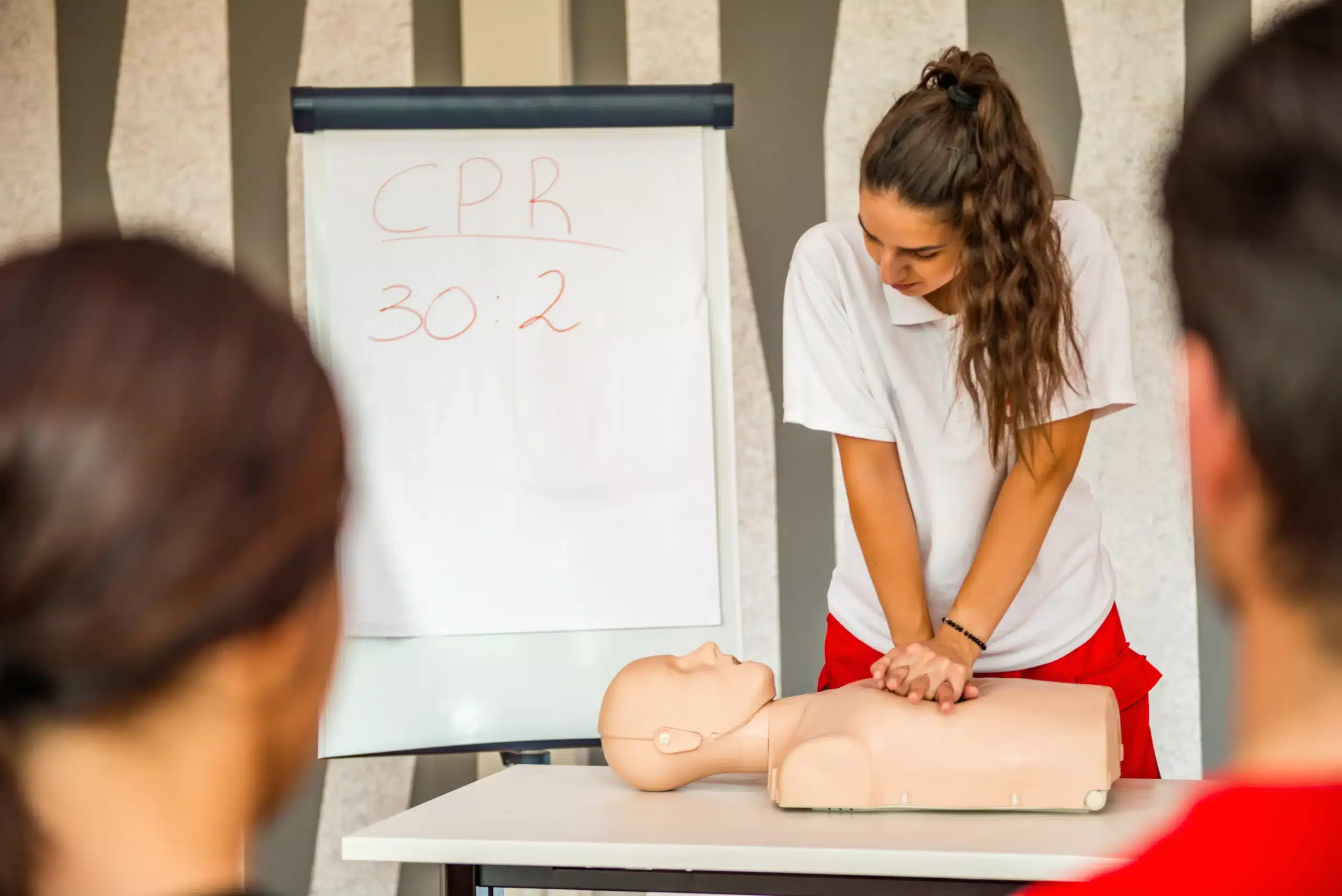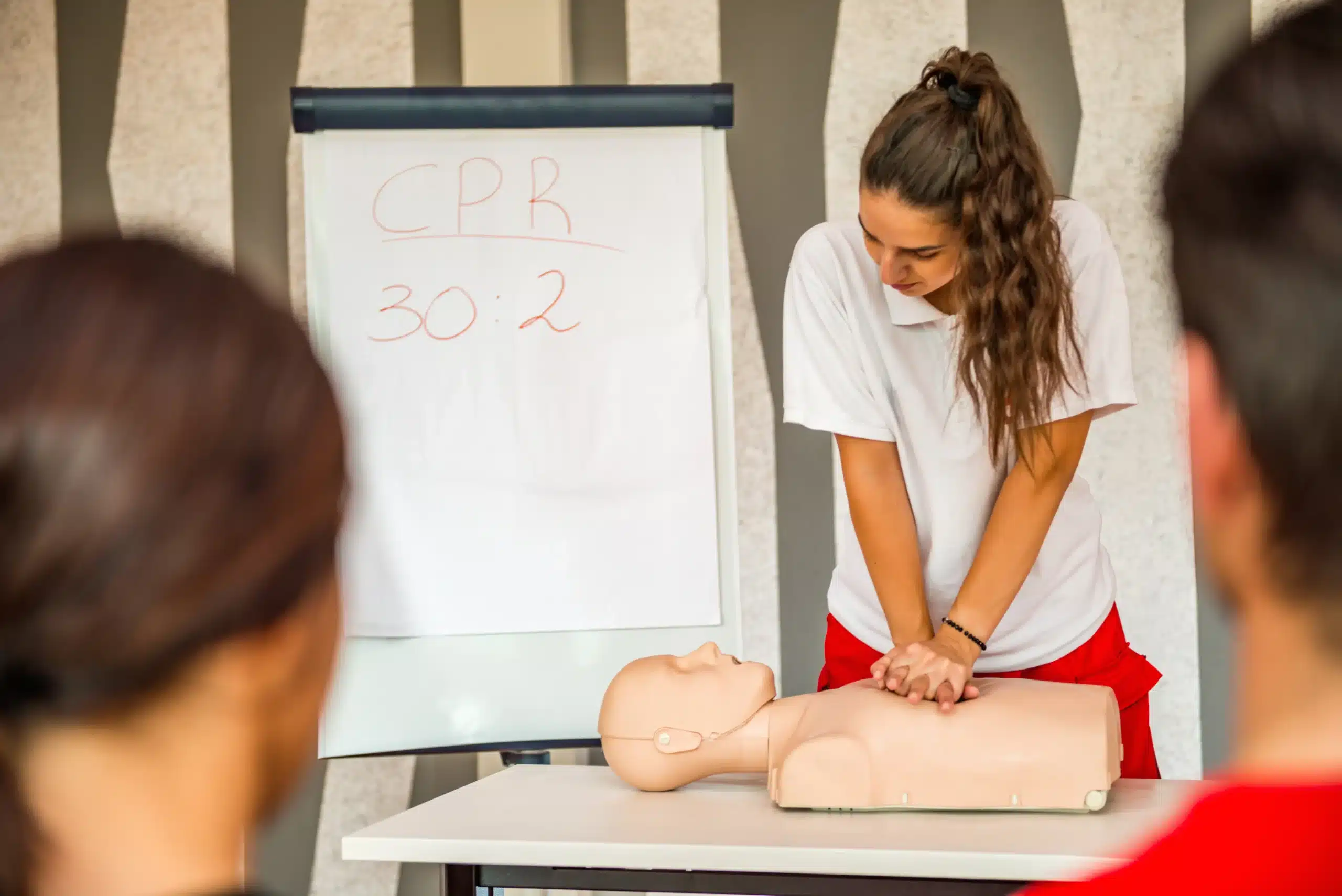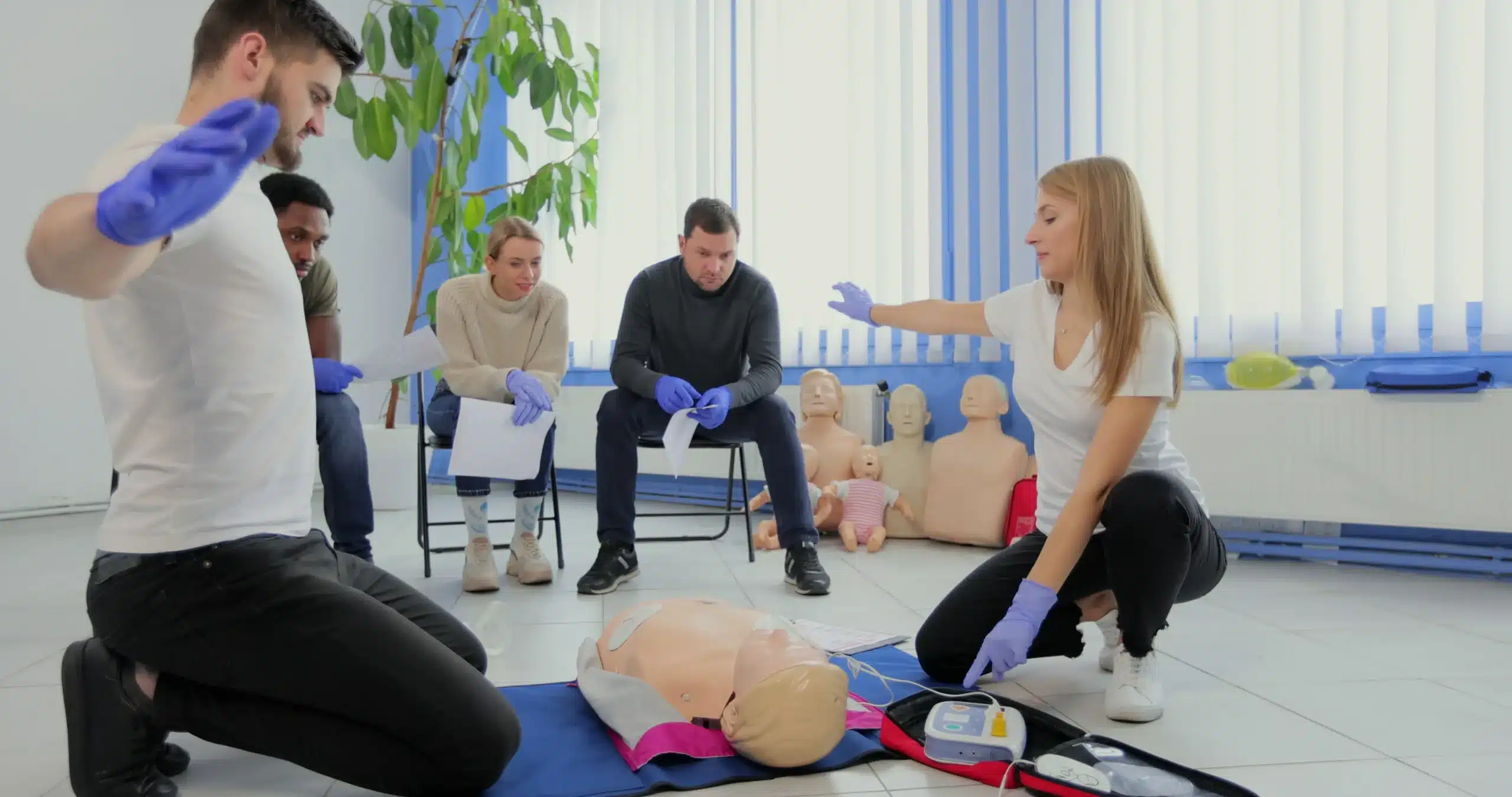First-aid training in Concord isn’t just for healthcare professionals—it’s a valuable skill for everyone. This post breaks down the essentials of first-aid training in Concord, making it easy to understand and accessible to all. We’ll cover the different types of courses available, from basic first aid and CPR to more advanced certifications. We’ll also discuss the costs, schedules, and what to expect during your training. Plus, we’ll provide tips on choosing the right course and instructor in Concord, so you can feel confident in your ability to handle emergencies.
Key Takeaways
- First-aid training prepares you for emergencies: Equipping yourself with these skills allows you to confidently handle various situations, from minor injuries to life-threatening events, bridging the gap until professional help arrives.
- Find the right course in Concord: Explore the diverse training options available in Concord, including CPR, BLS, ACLS, PALS, and general first aid. Consider factors like course content, schedule flexibility, instructor qualifications, and cost when making your decision.
- Stay current with first-aid practices: Maintain your skills and knowledge through regular practice and refresher courses. Staying updated on the latest guidelines ensures you can provide effective and safe care when needed.
What is First-Aid Training in Concord?
First-aid training in Concord equips you with the skills to handle medical emergencies. These courses cover essential topics like CPR, wound care, and managing common emergencies such as choking, burns, and allergic reactions. As the Red Cross explains, first aid is about recognizing when someone needs help and responding quickly, providing crucial support until professional help arrives. Learning these skills can make a real difference in someone’s life.
Several organizations in Concord offer certified first-aid training, including programs accredited by the American Heart Association. Concord CPR Classes offers a range of AHA-certified courses, including Basic Life Support (BLS), Advanced Cardiovascular Life Support (ACLS), Pediatric Advanced Life Support (PALS), and comprehensive first-aid training. These courses combine theoretical knowledge with hands-on practice, giving you the confidence to act effectively in critical situations. My CPR Certification Online emphasizes that basic first-aid training covers fundamental skills like CPR, wound care, and fracture management, empowering you to address common emergencies. This combination of knowledge and practical experience makes these courses invaluable for anyone wanting to be prepared for unexpected events.
First-Aid Certification Courses Available
Finding the right first-aid certification course can feel overwhelming with so many options. This section breaks down the most common types available in Concord, so you can choose the best fit for your needs.
CPR Certification
CPR certification is a foundational course for anyone looking to learn basic life-saving skills. These CPR courses teach you how to recognize cardiac arrest and provide chest compressions and rescue breaths. Concord CPR Classes offers American Heart Association (AHA) certified courses, ensuring you receive high-quality training that meets nationally recognized standards. They serve Concord, Walnut Creek, Pleasant Hill, and the surrounding Contra Costa County.
Basic Life Support (BLS)
Basic Life Support (BLS) certification goes a step further than basic CPR. It’s designed for healthcare providers and professionals who need a more comprehensive understanding of life support techniques. BLS certification covers everything from single-rescuer CPR to team-based resuscitation scenarios. Concord CPR Classes offers the AHA’s Resuscitation Quality Improvement (RQI) program, a popular choice for medical professionals seeking efficient and up-to-date training. You can learn more about the RQI program on their RQI page.
Advanced Cardiovascular Life Support (ACLS)
For healthcare professionals dealing with more complex cardiovascular emergencies, Advanced Cardiovascular Life Support (ACLS) certification is essential. This advanced course covers a wide range of topics, including airway management, pharmacology, and effective team dynamics during a cardiac crisis. ACLS training is available through Concord CPR Classes.
Pediatric Advanced Life Support (PALS)
Pediatric Advanced Life Support (PALS) certification focuses on the specific needs of infants and children facing life-threatening situations. This specialized training equips healthcare providers with the skills to manage respiratory emergencies, cardiac arrest, and other pediatric-specific medical crises. You can find PALS courses in Concord through Concord CPR Classes.
General First Aid
Beyond CPR and specialized life support, general first-aid training provides practical skills for handling everyday injuries and medical situations. These first-aid courses cover essential topics like wound care, managing fractures and sprains, and responding to common medical emergencies like allergic reactions. This training is valuable for anyone, from parents and teachers to workplace safety officers and community members.
Cost of First-Aid Training in Concord
Knowing the cost of first-aid training helps you budget effectively. Let’s break down the typical expenses associated with these important courses in Concord.
Average Price Ranges
First-aid training courses in Concord, CA, typically cost between $50 and $200. This price difference depends on several factors, including the course level, the certifying organization (like the American Heart Association or the American Red Cross), and the specific training provider. Basic first-aid classes tend to be on the lower end of the spectrum, while more advanced certifications, such as wilderness first aid or those including CPR/AED training, may be more expensive.
Group Discounts and Special Offers
If you’re training a group, look for group discounts. Many training centers offer reduced rates for businesses, schools, community groups, or even families signing up together. This can significantly lower the per-person cost, making training your team more economical. Concord CPR Classes offer discounts for group training.
Low-Price Guarantees
Some training centers in Concord offer low-price guarantees, promising the lowest prices in the area. This can be a great way to save money while still receiving high-quality instruction. If you’re price-conscious, look for providers who offer these guarantees to ensure you get the best possible value. Comparing prices and offerings from different providers is always recommended to find the best fit for your needs and budget.
First-Aid Class Schedules & Formats
Finding a first-aid class that fits your schedule shouldn’t feel like another hurdle. Thankfully, there are tons of options available, from weekday and weekend courses to blended learning formats. Let’s break down what you can expect in Concord.
Weekday and Weekend Options
Juggling work, family, and other commitments? No problem. Many providers offer first-aid courses seven days a week, often with morning and afternoon sessions. This flexibility makes it easier to find a time that works, even with a packed schedule. Check with specific training centers in Concord, like Concord CPR Classes, for their exact weekly schedules. They serve Concord, Walnut Creek, and Pleasant Hill.
Evening Classes
If daytime classes just won’t work, look for providers offering evening courses. These are perfect for those who work during the day or have other commitments. Evening classes often cover the same material as daytime sessions, ensuring you receive comprehensive training regardless of when you attend. This option is frequently available for both individuals and groups, so consider gathering a group of friends or colleagues for a discounted rate at Concord CPR Classes.
Online and Blended Learning
Want to learn at your own pace? Blended learning programs, like the RQI program, combine online coursework with in-person skills sessions. This approach lets you complete the knowledge portion online whenever it’s convenient, then schedule a short, hands-on session to practice your skills and get certified. It’s a great option for those who prefer a more flexible learning experience. For healthcare professionals seeking a quicker path to recertification, the RQI program offered by Concord CPR Classes is a convenient choice.
Course Duration
First-aid training is designed to be efficient and effective. Most courses can be completed in just a few hours, making it a manageable commitment even for busy individuals. This focused approach ensures you learn the essential skills quickly and gain the confidence to respond to emergencies. This makes it easy to fit first aid training into your schedule.
Instructor Qualifications
Knowing your instructor’s qualifications is key when choosing a first-aid course. Look for instructors who meet these criteria:
Certification Requirements
Instructors should hold certifications from nationally recognized organizations like the American Heart Association (AHA) or the American Red Cross. For example, to teach CPR, instructors typically hold an AHA BLS CPR Instructor Certification. These certifications demonstrate that the instructor has met specific training standards and is qualified to teach these life-saving skills. Many job postings for CPR instructors specifically require these certifications.
Healthcare Backgrounds
While not always mandatory, a healthcare background can be a valuable asset for a first-aid instructor. Instructors with experience in fields like nursing or emergency medical services often bring a deeper understanding of first-aid principles. This practical experience can enrich the learning experience, providing students with relevant insights. Some training centers, like the CPR Training Center, highlight the healthcare backgrounds of their instructors.
Ongoing Training
The healthcare field is constantly evolving. It’s essential for first-aid instructors to pursue ongoing training to stay up-to-date. Look for instructors who actively participate in continuing education programs. This commitment ensures they are teaching the most current and effective techniques. Programs like the RQI program emphasize the importance of ongoing training for CPR instructors, focusing on skill maintenance and improvement.
Benefits of First-Aid Certification
Emergency Preparedness
First-aid training gives you the skills to recognize and respond to emergencies effectively. It’s all about seeing when someone needs help and acting fast. Even basic first aid can be life-saving while you wait for professional medical help. This preparedness can truly make all the difference in critical situations. Knowing how to control bleeding, stabilize an injury, or perform CPR can buy precious time until paramedics arrive. This immediate action can significantly impact the outcome of an emergency. The Red Cross offers more information on first aid basics.
Career Advancement
Holding first aid and CPR certifications can strengthen your resume and make you a more desirable candidate to potential employers. These certifications show valuable skills applicable to various industries, from healthcare and education to childcare and construction. Many employers see these certifications as a sign of responsibility and initiative. Adding these credentials to your resume can improve your chances of getting a job, especially in fields where safety is a priority. The Red Cross discusses the value of first aid certifications, highlighting their importance in various job sectors.
Workplace Safety
First-aid training is essential for a safe work environment. Having trained employees who can handle emergencies effectively reduces workplace accidents and injuries. A company culture that prioritizes first aid creates a more secure and supportive atmosphere. Concord CPR Classes, offered by CPR Training Center, emphasizes low-stress learning environments taught by healthcare providers, a key element in effective workplace safety training. Prepared employees can respond confidently to incidents, potentially lessening the severity of injuries and promoting a quicker return to work.
Confidence in Emergencies
First-aid training covers many common emergencies, from choking and burns to allergic reactions, heart attacks, and strokes. It often includes CPR and AED training, giving you the confidence to respond effectively in various situations. This confidence is invaluable in high-pressure situations demanding quick, decisive action. Knowing you have the skills to handle an emergency can help you stay calm and focused, allowing you to provide essential assistance until professional help arrives. The Red Cross website offers more information on what first aid training covers.
Choose the Right First-Aid Course
Finding the right first-aid course involves understanding your specific needs, comparing course content, and checking how certification works. Taking a few minutes to consider these points can make a big difference in your learning experience.
Assess Your Needs
First-aid training fits into busy schedules. It takes just a few hours to gain potentially life-saving skills and the confidence to act in an emergency. Ask yourself why you want first-aid training. Is it a job requirement, or for personal knowledge? Do you need basic first aid or more advanced skills? Understanding your motivation will help you choose the right course. For basic skills, a general first-aid class might be perfect. If you work in healthcare, you might need something more comprehensive, like the BLS course offered by Concord CPR Classes.
Compare Course Content
Once you know what you need, look at what each course covers. Basic first-aid training typically includes essential skills like CPR, wound care, and how to handle fractures. More advanced courses might cover specific situations, like wilderness first aid or allergic reactions. The American Heart Association courses like ACLS and PALS offered through Concord CPR Classes cover life support techniques for adults, children, and infants. Compare course content to ensure it aligns with your goals. If you’re unsure, contact the training provider. Concord CPR Classes can help you determine which course best suits your needs.
Certification Validity
Check how long each program’s certification is valid. Some are valid for two years, while others may require more frequent renewal. For example, after completing a course with Concord CPR Classes, students receive an American Heart Association certification card valid for two years. The Red Cross also offers first-aid training covering common emergencies like choking, burns, allergic reactions, heart attacks, and strokes. Understanding the certification period helps you stay current with your skills and meet any requirements for your job or personal goals.
First-Aid Training Providers in Concord
Finding the right first-aid training program can feel overwhelming, but several excellent providers serve the Concord, CA area. Here are a few options to explore:
Concord CPR Classes
Concord CPR Classes offers a range of courses, including BLS, ACLS, PALS, CPR, and First-Aid. They use the American Heart Association’s RQI program, a streamlined approach to certification, especially beneficial for busy healthcare professionals. Their commitment to providing group discounts makes them a cost-effective choice for workplaces or groups of friends. Learn more about their CPR and First-Aid courses.
CPR Training Center
The CPR Training Center focuses on American Heart Association CPR training and recertification, serving Concord, Pleasant Hill, and Walnut Creek. As an AHA Authorized Training Center, they maintain high standards of instruction. Check their website for upcoming courses.
Safety Training Seminars
Safety Training Seminars, a woman-owned and AHA-authorized training center, offers BLS, ACLS, PALS, CPR, and First-Aid training. They provide classes daily in numerous locations, offering flexibility for those with busy schedules. You can find more information about their course offerings on their website.
CPR for Life
CPR for Life specializes in CPR and First Aid training in Concord and the surrounding Bay Area. Their affiliation with both the American Heart Association and EMS Safety Services ensures their courses meet industry standards. Visit the CPR for Life website to learn more.
Red Cross Training Centers
The Red Cross offers a variety of First Aid training options, including online, in-person, and blended learning formats. This allows you to choose the learning style that best suits your needs and schedule. Explore their different learning formats to find the right fit.
Prepare for Your First-Aid Course
So, you’ve decided to get your first-aid certification—fantastic! Knowing what to expect can help you feel confident and prepared. This section covers everything you need to know before your first class at Concord CPR Classes.
What to Expect
First aid is all about recognizing when someone needs help and responding quickly. Even basic first aid can save a life until professional help arrives. Your first-aid course will cover essential skills, from treating minor injuries like cuts and burns to managing more serious situations like choking, allergic reactions, heart attacks, and strokes. Most first-aid courses also include CPR and AED training, giving you a well-rounded skill set to handle various emergencies. You can learn more about the importance of first aid from the Red Cross.
What to Bring
Your first-aid course will be a combination of instruction, demonstrations, and hands-on practice. Comfortable clothing is essential, as you’ll be actively participating in scenarios and practicing techniques. A notebook and pen are helpful for taking notes, though many courses provide materials. Bringing a water bottle is also a good idea to stay hydrated, especially during longer sessions. Check with Concord CPR Classes to see if they recommend any specific materials. Some CPR AED certification classes in Concord are ASHI two-year certification courses for non-medical professionals.
Pre-Course Study
While pre-course studying isn’t usually required for general first-aid certification, familiarizing yourself with basic first-aid principles can be helpful. Brushing up on topics like wound care, recognizing signs of a heart attack, or the steps of CPR can give you a head start. If you’re a healthcare professional pursuing certifications like BLS, ACLS, or PALS through the American Heart Association, consider exploring their RQI program. The RQI program emphasizes frequent practice and personalized feedback to improve CPR skills and patient care. This preparation can make your learning experience more effective and help you confidently apply these life-saving skills.
Apply & Maintain First-Aid Skills
Knowing first-aid procedures is one thing, but confidently applying them in a real-life emergency is another. This section emphasizes the importance of practical application, staying current with the latest guidelines, and refreshing your skills periodically.
Real-World Application
First aid is all about quick thinking and decisive action. It’s about recognizing when someone needs help and responding effectively, even before professional help arrives. Basic first aid knowledge can make a critical difference in stabilizing a situation and potentially saving a life. Think of scenarios like treating minor burns, controlling bleeding, or performing CPR—these skills are invaluable in everyday life. Regular practice through realistic scenarios can build your confidence and improve your response time in actual emergencies.
Refresher Courses
Even seasoned first-aid providers benefit from regular refresher courses. Medical best practices and guidelines evolve, so staying current is crucial for providing effective care. RQI programs offer a great way to brush up on your skills, especially for healthcare professionals in Concord. These programs often incorporate personalized feedback and frequent practice, leading to improved patient outcomes and reinforcing best practices. Regular review helps maintain muscle memory and ensures you’re prepared to act quickly and efficiently under pressure.
Stay Updated
Staying up-to-date with the latest first-aid practices is essential for everyone. The American Heart Association’s RQI program is a popular and efficient way to get certified in BLS, ACLS, and PALS. These certifications are nationally recognized and demonstrate your commitment to providing high-quality care. For those seeking certification or recertification, the RQI program offers a streamlined and convenient certification process. Regularly reviewing and updating your knowledge ensures you’re prepared to handle various emergencies effectively.
Related Articles
- CPR, BLS, ACLS, PALS, & First-aid Course Preparation in Concord
- CPR Classes in Concord, CA: Your Complete Guide – Concord CPR Classes
- BLS for Healthcare Providers in Concord: A Complete Guide – Concord CPR Classes
- Online ACLS Classes in Concord: Your Guide – Concord CPR Classes
- AHA PALS Classes in Concord, CA – Concord CPR Classes
Frequently Asked Questions
What’s the difference between CPR and First Aid?
CPR focuses specifically on life-threatening situations where someone’s breathing or heartbeat has stopped. First aid covers a broader range of medical emergencies, from minor injuries like cuts and burns to more serious situations like choking or allergic reactions. Often, first-aid courses include CPR training as a core component.
How much does first-aid training cost in Concord?
First-aid training costs vary depending on the course type and provider. Basic first-aid courses typically range from $50 to $100, while more advanced certifications like BLS or ACLS can cost between $100 and $200. Many providers offer group discounts, so check for those if you’re training with friends, family, or colleagues. Concord CPR Classes, for example, has a low-price guarantee and offers discounts for group training.
How long does it take to get first-aid certified?
Most first-aid courses can be completed in a single day, often within a few hours. Some blended learning options combine online coursework with a shorter in-person skills session, offering more flexibility. Check with your chosen provider for their specific course duration.
What if my work schedule makes it hard to attend a class?
Many training centers understand busy schedules and offer various class times, including evenings and weekends. Some also provide blended learning formats, allowing you to complete the coursework online at your own pace and then schedule a brief in-person skills session. Contact providers like Concord CPR Classes directly to discuss scheduling options.
How do I choose the right first-aid course for me?
Consider your reasons for wanting first-aid training. Are you fulfilling a job requirement, pursuing a career in healthcare, or simply seeking personal knowledge? Once you know your goals, compare course content from different providers. Basic first aid is suitable for general knowledge, while healthcare professionals might need more specialized training like BLS or ACLS.


